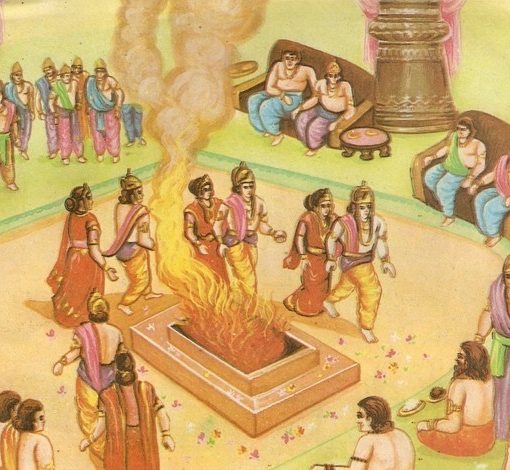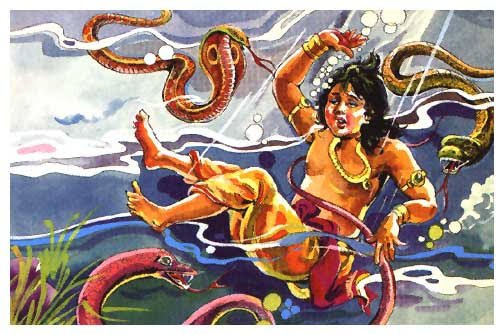Within a month, Vyāsadeva was called. Once again he came from his austerities and appeared in a repulsive condition. Satyavatī led him to Ambālikā’s bedchamber and the sage at once entered. Even though she had been warned by her sister what to expect, the princess was still struck with horror when the grim ascetic approached her. She turned pale with fright, although she kept her eyes open as she conceived. Vyāsadeva then said to the horrified princess, “As you have turned pale upon seeing me, so your son shall also be pale. He will therefore be named Pāṇḍu, the ‘pale one’.” The ṛṣi then left the room. He met his mother outside and she asked about the child. Vyāsadeva replied to her that a greatly powerful boy would be born but he would be pale.
Satyavatī again felt anxious. The child would be pale? What did Vyāsadeva mean? Something was still not right. And in any event, even if everything was fine with this child, with only one qualified prince the kingdom would still be in a precarious position. Vyāsadeva should try once more. She asked him to again approach Ambikā. This time the princess, knowing what to expect, would keep her eyes open. Vyāsadeva smiled and replied, “Be it so. I shall return again shortly after she has delivered her first child.”
In due course of time Ambikā gave birth to a blind child who was named Dhṛtarāṣṭra. Ambālikā delivered a pale child who was nevertheless effulgent and endowed with many auspicious marks on his body, and who was named Pāṇḍu in accord with Vyāsadeva’s words. Soon after, the sage again came to the palace in order to approach Ambikā for a second time.
The queen was alarmed at the prospect of meeting again with the terrible-looking ṛṣi. She went to a maidservant who was an intimate friend and asked that she take her place. Giving the servant her own ornaments and adorning her with the finest robes, she had her wait in the bedchamber for the sage.


Again Satyavatī was waiting outside the bedchamber. Vyāsadeva told her, “The queen deceived me and sent instead her servant. That simple girl received me with all respect. She will therefore bear an auspicious child. O Mother, I shall now go and continue my asceticism. I will return when you need me again, but I will not beget any more children.” Vyāsadeva vanished, leaving Bhīṣma and Satyavatī reflecting on his words.
The maidservant gave birth to a child named Vidura, who later became the chief minister and advisor of the Kuru house. He was raised alongside his two brothers, and the three boys grew up like resplendent gods. Everyone was satisfied that the kingdom was secure. Happiness and prosperity were everywhere as the gods showered their blessings on the kingdom. Bhīṣma ruled as regent while the boys grew up.
Although Dhṛtarāṣṭra was the eldest, his blindness disqualified him from becoming the king. Nor could Vidura assume the throne, as he was born of a servant girl. But Pāṇḍu was a worthy monarch in every way; and when he came of age, he was installed on the Kuru throne. Pāṇḍu excelled all men in archery, and he soon became skilled in the Vedic science of leadership and diplomacy.





